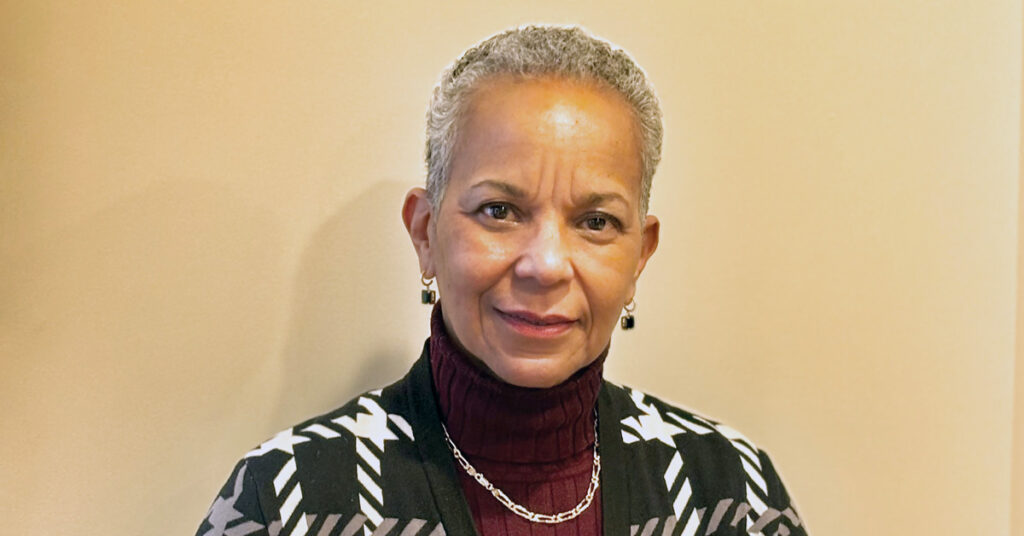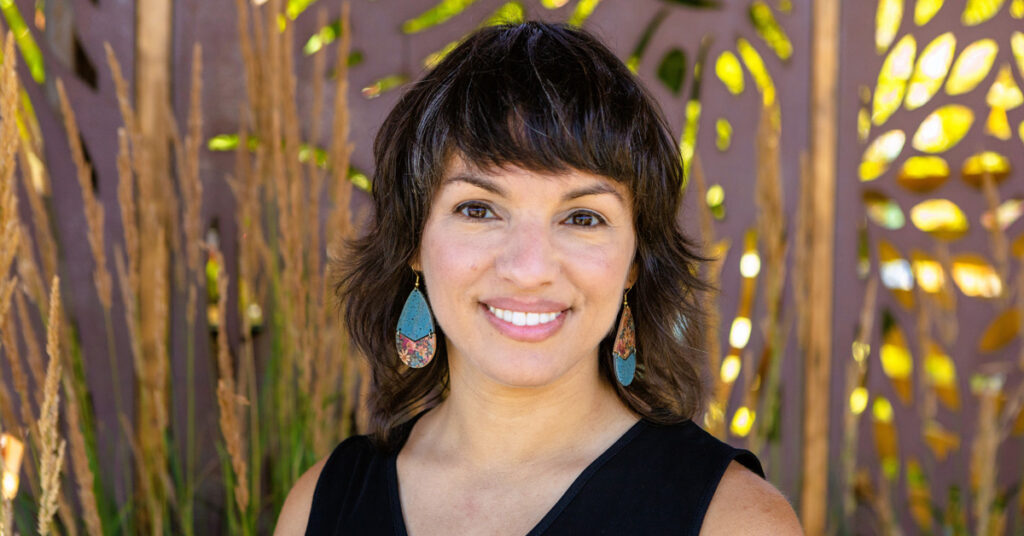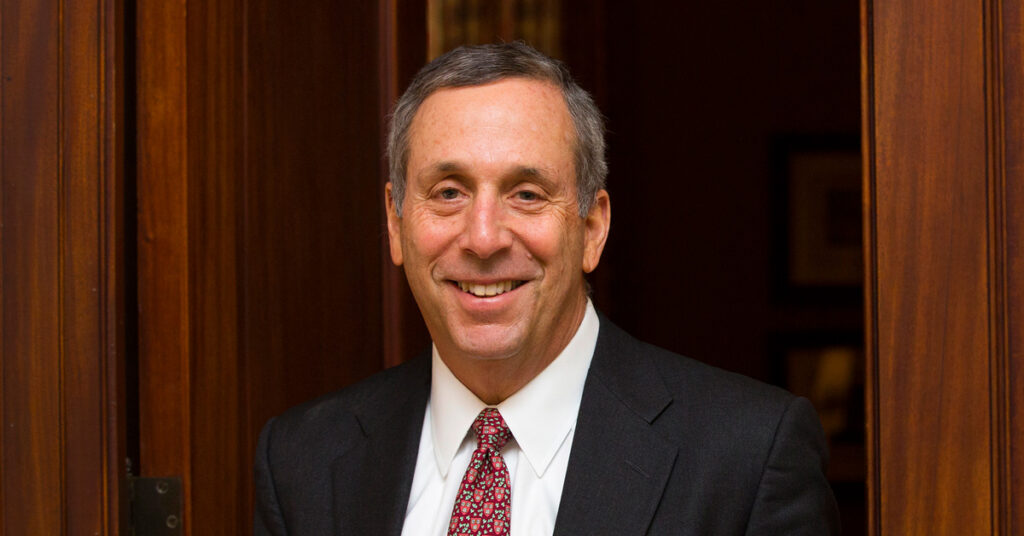On this page:
- Carol Samuels-Botts, M.D., retired pediatrician, Class of 1974 alumna, former trustee
- Mónica Guzmán, bridge builder, journalist and author
- Lawrence S. Bacow, former president of Harvard University and Tufts, former Wheaton trustee

Carol Samuels-Botts, M.D., retired pediatrician, Class of 1974 alumna, former trustee
Dr. Carol Samuels-Botts majored in chemistry at Wheaton College, earned her medical degree from Howard University College of Medicine and completed a three-year pediatric residency program at the University of Maryland. She is board certified and a Fellow of the American Academy of Pediatrics.
Passionate about the practice of pediatrics, she strongly believes that the health and wellbeing of infants, children and adolescents are essential to the success of communities, and that dedicated physicians are necessary to provide comprehensive medical care and guidance.
During her long career with the Mid-Atlantic Permanente Medical Group, P.C., she sought to make a difference by sharing her skills and expertise. Samuels-Botts has been involved in designing medical care teams that best support patient needs, and in the recruitment, hiring and retention of physician colleagues. She also has shown care for her patients by advocating for medical ethics and becoming involved in community relations and government affairs initiatives.
She completed the Kaiser Permanente Executive Program in 1993 and, while continuing to practice general pediatrics, she held several physician leadership positions. This leadership included serving two terms as a director on the Maryland Board of Physicians, the state agency responsible for the licensing, discipline and education of Maryland physicians.
The Governor of Maryland appointed her to state commissions on medical practice parameters, asthma and autism, where she has influenced medical practice standards in each of those areas. Because of her accomplishments, she was included on the list of “Top Doctors” in several issues of Washingtonian magazine. She also has received a State of Maryland Governor’s Citation, was named Mother of the Year by the National Capital Area Chapter of the March of Dimes, and listed among the Washington, D.C.–Baltimore-Northern Virginia Super Doctors.
In retirement, Samuels-Botts has provided medical care at a clinic in an underserved immigrant community and has worked with a women’s philanthropic organization to award grants. As an experienced member of the AARP Maryland Speakers Bureau, she also has shared her expertise by giving presentations on aging, caregiving and other quality of life topics.
Her liberal arts education not only provided her with the foundation for her medical career but also has encouraged her to pursue her interest in art. Currently, she volunteers as a docent at the Smithsonian Institution’s National Portrait Gallery in Washington, D.C., conducting tours since 2019.
Continuing her close ties to Wheaton, she has been a generous philanthropist to the college, served on the Wheaton Alumni Board of Directors from 1993 to 1996 and 2001 to 2006, and helped establish the Black Alumni Association. Samuels-Botts also served a five-year term as an alumna trustee on the Wheaton Board of Trustees from 2001 to 2006.
Mónica Guzmán, bridge builder, journalist and author
Mónica Guzmán works to inspire conversations driven by curiosity to break down the barriers that divide people.
Her book I Never Thought of It That Way: How to Have Fearlessly Curious Conversations in Dangerously Divided Times explores how to connect with people who hold differing viewpoints. It was a New York Times recommended read and was featured in Reader’s Digest and The Christian Science Monitor, and on the Glenn Beck podcast.
As the host of the Braver Angels podcast, “A Braver Way,” Guzmán seeks to equip people with the tools they need to bridge the political divide in their everyday lives. She also does this as an advisor for Starts With Us and the Generations Over Dinner project, which brings together participants of varying ages for meaningful conversations.
Guzmán has a bachelor’s degree in sociology and film studies from Bowdoin College. A lifelong learner, she was a 2019 fellow at the Henry M. Jackson Foundation, where she studied social and political division, and a 2016 fellow at the Nieman Foundation for Journalism at Harvard University, where she researched how journalists can rethink their roles to better meet the needs of a participatory public. In 2023, she was the inaugural McGurn Fellow at the University of Florida, working with researchers at the UF College of Journalism and Communications and beyond to better understand how to employ techniques for boosting understanding.
Guzmán is a long-time journalist and the co-founder of the award-winning Seattle newsletter The Evergrey, which seeks to connect residents through curated event listings, explanations about what is happening in the city and why it matters, and stories about those who make Seattle a brighter place. This work contributed to her and her Evergrey co-founder being recognized on the 50 Most Influential Women in Seattle list.
In spring 2023, she visited Wheaton for workshops and conversations with staff, faculty and students to explore how to have discussions that bridge cultural, political and ideological divides as part of the Diana Davis Spencer Debate and Dialogue Series.
Lawrence S. Bacow, former president of Harvard University and Tufts, former Wheaton trustee
Lawrence S. Bacow served as the 29th president of Harvard University from 2018 until 2023. Widely recognized as one of higher education’s most respected leaders, Bacow’s tenure at Harvard was marked by the creation of a range of academic initiatives, advocacy for public service and immigration, diversity and access to opportunity, and steady leadership of the university through the COVID-19 pandemic.
Upon taking office in 2018, Bacow created new interdisciplinary collaborations on issues such as climate change, inequality, global health, the future of cities, as well as new initiatives in science and technology. The Harvard & the Legacy of Slavery initiative, the Harvard Quantum Initiative, the Kempner Institute for the Study of Natural and Artificial Intelligence, the Bloomberg Center for Cities and the Salata Institute for Climate and Sustainability were all established during Bacow’s tenure.
During the COVID-19 pandemic, at his direction, Harvard became one of the first universities to shift coursework online in March 2020. In July 2020, in response to a U.S. Immigration and Customs Enforcement announcement that international students would have to depart the country if attending institutions that shifted to online instruction, Bacow initiated a successful lawsuit to stop the directive, ensuring that more than a million international students nationwide would be able to continue their studies in the United States.
Prior to being elected to the Harvard presidency in 2018, Bacow served for seven years as a member of the Harvard Corporation, one of two of the university’s governing boards. Bacow maintained an active academic portfolio while serving on the corporation, with a scholarly focus on higher education and leadership. From 2011 to 2014, he served as president-in-residence in the Higher Education Program at Harvard’s Graduate School of Education. From 2014 to 2018, he served as the Hauser Leader-in-Residence at the Harvard Kennedy School of Government’s Center for Public Leadership. During this period, he devoted his time to writing and speaking on salient topics in higher education—innovations in learning, academic freedom, the economics of universities, the impact of digital technologies and university governance and leadership, among others.
Prior to joining Harvard, Bacow was president of Tufts University from 2001 to 2011. During his tenure, he advanced the university’s commitment to excellence in teaching, research and public service, and fostered collaboration across the university’s eight schools. Under his leadership, Tufts pursued initiatives to enhance the undergraduate experience, deepen graduate and professional education and research in critical fields, broaden international engagement and promote active citizenship among members of the university community.
While at Tufts, Bacow emerged as a nationally recognized champion of expanding access to higher education through need-based student aid, while also advocating vigorously for federal support of university-based research. In 2005, Bacow convened an international conference of higher education leaders that led to the creation of the Talloires Network, a global association of 431 colleges and universities committed to strengthening the civic roles and social responsibilities of higher education.
Bacow’s leadership has extended well beyond the campus. In addition to serving as a member of the Wheaton board from 1999 to 2009, he has served on the boards of the American Council on Education, the Association of American Universities, and the Consortium on Advancing Higher Education. He chaired the Council of Presidents of the Association of Governing Boards of Universities and Colleges, and the executive committee of the Association of Independent Colleges and Universities in Massachusetts.
Before his time at Tufts, Bacow spent 24 years on the faculty of the Massachusetts Institute of Technology, where he held the Lee and Geraldine Martin Professorship of Environmental Studies. He served as the elected chair of the faculty (1995–97) and then as chancellor (1998–2001), one of the institute’s most senior academic officers. He is the author or co-author of four books and numerous scholarly articles.
Interested in math and science from an early age, Bacow attended college at MIT, where he received his S.B. in economics in three years and was a member of Phi Beta Kappa. He went on to earn three degrees from Harvard: a J.D. from Harvard Law School, an M.P.P. from the Harvard Kennedy School of Government, and a Ph.D. in public policy from the Graduate School of Arts and Sciences.


